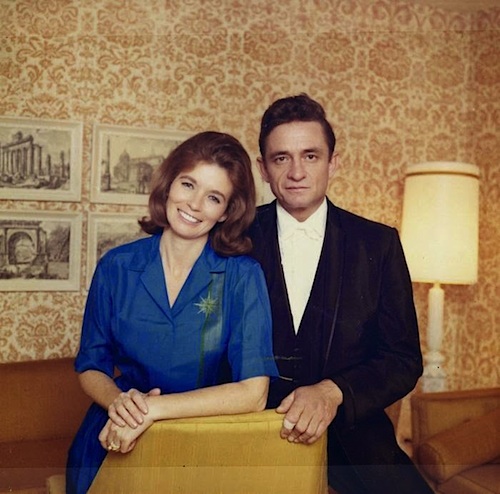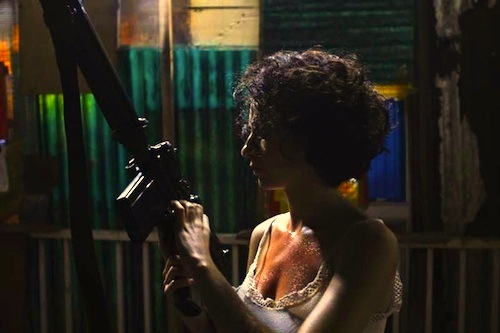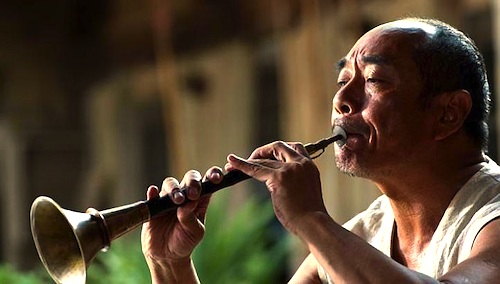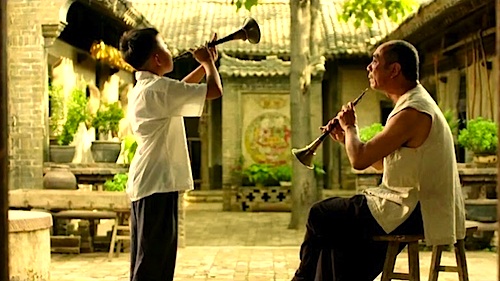By Joe Bendel. They are the first family of American Roots music and they represent royalty at its most hardscrabble. While many of their songs dated back generations, country music as a thing to market and identify with pretty much started with the Carter Family and a handful of other artists signed to Victor Records during the recording industry’s infancy. Beth Harrington chronicles the family history behind the music in The Winding Stream: the Carters, the Cashes, and the Course of Country Music, which screens free of charge during the Film Society of Lincoln Center’s Sound + Vision Film Series.
The Carters lived most of their lives in the Poor Valley region of southern Virginia. It was not named with irony. The land is hard and unforgiving, but most work still revolves around agriculture. However, A.P. Carter had an ambitious notion that the family’s musical talent could earn them a better life. With his somewhat reluctant wife Sara and sister-in-law Maybelle, Carter formed a trio that would be known professionally as the Carter Family. At great inconvenience, A.P. dragged the women out to perform for Victor producer Ralph Peer, who was scouring the region like a commercial Alan Lomax for songs that would appeal to a “traditional” market.
Of course, the Carter Family perfectly fit the bill, but they nearly forgot about their legendary sessions during the lag between the informal recordings and the release of their 78s. Nevertheless, they sold well enough to vindicate A.P. Carter’s lofty ambitions. Unfortunately, the original ensemble would eventually fracture along with A.P.’s marriage to Sara. For years, Maybelle Carter performed with her daughters as Mother Maybelle and the Carter Sisters before reclaiming the official Carter Family mantle. As most fans know, one of the Carter Sisters was June, who turned the head of a talented but troubled young performer named Johnny Cash.

While telling the Carter story, Harrington also addresses some largely forgotten early Twentieth Century cultural history, such as the phenomenon of ultra-high wattage Border Radio and the ethically problematic attribution of traditional songs assumed by the likes of A.P. Carter. For obvious reasons, Johnny Cash plays an essential role in the film, but Harrington never lets him outshine the Carters. Her musical instincts are also quite shrewd, including plenty of archival clips, a stirring rendition of the title song by Rosanne Cash, and a bizarrely good musical flash mob performance of “Will the Circle Be Unbroken,” attesting to the song’s lasting resonance.
Harrington does indeed touch all the necessary documentary bases, but arguably what is most refreshing about Stream is her sensitive treatment of the largely white, God-fearing, under-advantaged population of Poor Valley. There is no sneering at their “Jesus talk” or condescending commentary on their un-cosmopolitan style. Instead, she respects them on their terms.
Winding is often entertaining, featuring original performances from the likes of John Prine and Cheryl Crow, but it also submerges viewers in the ancient spirit of their artifice-free music. One commentator says the Carters’ music exposes us as the “fakers” we are—and it is easy to get what he means. Recommended for fans of “roots” music and those who appreciate old school Americana, The Winding Stream screens for free this coming Monday (8/4) at the Walter Reade Theater, as part of Sound + Vision.
LFM GRADE: A-
Posted on July 31st, 2014 at 10:53pm.



